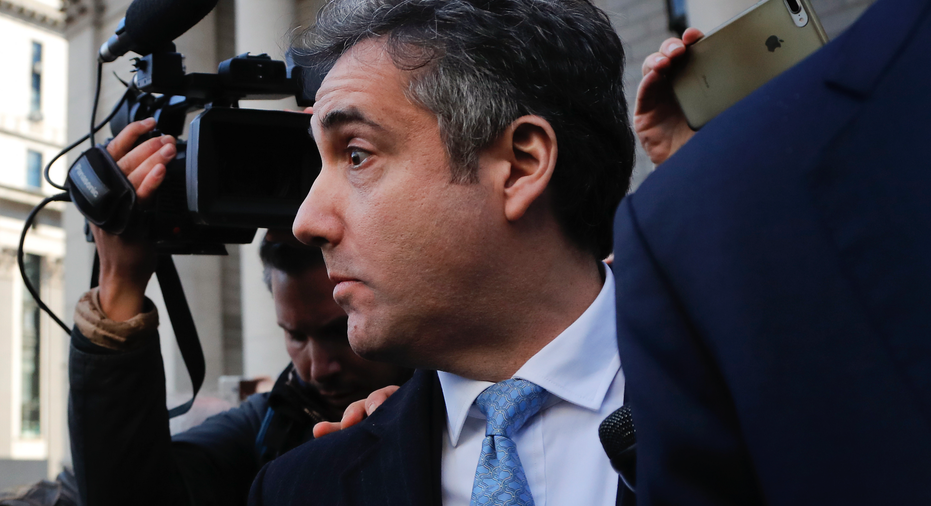Questions surround scuttled Trump Tower Moscow deal

NEW YORK – There is no Trump Tower Moscow.
But the quest to build one has become a legal flashpoint for the presidency of Donald Trump after his former attorney Michael Cohen pleaded guilty to lying to Congress to cover up his efforts to negotiate a real estate deal in Russia on Trump's behalf.
An hour after Cohen's plea on Thursday, Trump denounced his former attorney as "weak" and "a liar" and vehemently denied that he had any inappropriate business dealings with Russia. The president said he was transparent about the possible Moscow project, but there is no record of him having mentioned it in 2015 or 2016. And his denials of business dealings with Moscow during the campaign all were cast in the present tense, gliding over any deals proposed in the past, an omission that left a misimpression.
Questions about Trump's relationship with Russia have shadowed his presidency and are part of special counsel Robert Mueller's ongoing investigation into Moscow's interference with the 2016 presidential election. Cohen's guilty plea came as part of his cooperation with Mueller.
Here are some of the questions surrounding the closely scrutinized deal:
___
WHAT DID TRUMP SAY DURING THE CAMPAIGN ABOUT HIS BUSINESS DEALINGS IN RUSSIA?
In July 2016, as news reports emerged that Russian government hackers were responsible for breaking into Democratic National Committee servers, Trump began to address his business relationships with Russia.
For the record," he tweeted on July 26, "I have ZERO investments in Russia."
He repeated variations of that claim throughout the campaign, including during the second general election debate with Hillary Clinton. He said then: "I don't deal there. I have no businesses there. I have no loans from Russia."
Trump's denials did not address any previous deals, though his sons who work at the Trump Organization have previously boasted about Russian investments. And without access to Trump's tax returns, verifying his claims proves difficult.
The negotiations about building the Moscow tower continued as late as June 2016, even though Cohen told two congressional committees last year that the talks had ended that January. And while Trump asserted that the Moscow project was common knowledge during the campaign, there is no record of him discussing it publicly.
He did tweet in November 2013, while thanking his hosts at the Miss Universe pageant in Russia, that "You have done a FANTASTIC job. TRUMP TOWER-MOSCOW is next."
___
WHAT DID TRUMP SAY AFTER COHEN'S GUILTY PLEA?
Trump on Thursday acknowledged that there had been talks "to build a building of some kind in Moscow."
But he added that "I decided not to do it. The primary reason — there could have been other reasons, but the primary reason, it was very simple: I was focused on running for president."
The president dismissed the assertion that dealing with Russia suggested any wrongdoing, stressing that he was still running his business, the Trump Organization, while also seeking office.
"I was running my business while I was campaigning," Trump said. "There was a good chance that I wouldn't have won, in which case I would have gone back into the business, and why should I lose lots of opportunities?"
Cohen, for his part, said he lied to Congress because "I made these statements to be consistent with (Trump's) political messaging and to be loyal to (Trump)," seeming to suggest that he thought the best thing to do would be to distance his former boss from any talk of Russian deals.
___
IS IT LEGAL OR ADVISABLE TO RUN A BUSINESS WHILE RUNNING FOR PRESIDENT?
It is not illegal for a candidate to continue to run a business while running for office.
Trump himself made this point on Thursday even as he attacked Cohen's credibility. The president added that "even if he was right, it doesn't matter, because I was allowed to do whatever I wanted during the campaign."
Still, most candidates, to avoid appearances of conflicts, distance themselves from their businesses during a race. Trump, a non-politician making his first run for office, took no such steps.
And, even after taking office, Trump did not fully divest himself of his company. He turned over day-to-day operations of the Trump Organization to others, including his two adult sons.
___
WHY DOES IT MATTER?
Cohen's revelations have broad ramifications for the Mueller probe and the presidency.
There is no clear link in the court filings between Cohen's lies and Mueller's central question of whether the Trump campaign colluded with Russia. Nothing said in court, or in associated court filings, addressed whether Trump or his aides had directed Cohen to mislead Congress.
But for Trump, it could damage his credibility. The business dealings were afoot at the same time he was displaying pro-Moscow campaign policies, meaning he was advocating policies favorable to Russia while Cohen was seeking Russian government help on the project.
Trump's frequent proclamations that there was "No collusion!" with Russia may be viewed more skeptically in that light. And he has already delivered shifting accounts of his relationship with Stormy Daniels, the porn star to whom Cohen paid hush money to keep her from talking about her affair with Trump.
Cohen is the first person charged by Mueller with lying to Congress, an indication the special counsel is prepared to treat that offense as seriously as lying to federal agents. It was a warning shot to dozens of others who have appeared before Congress. And Cohen, who has met with Mueller at least seven times, may provide more damaging information related to Trump from his decade working as the now-president's so-called "fixer."
___
Follow Lemire on Twitter at http://twitter.com/@JonLemire



















